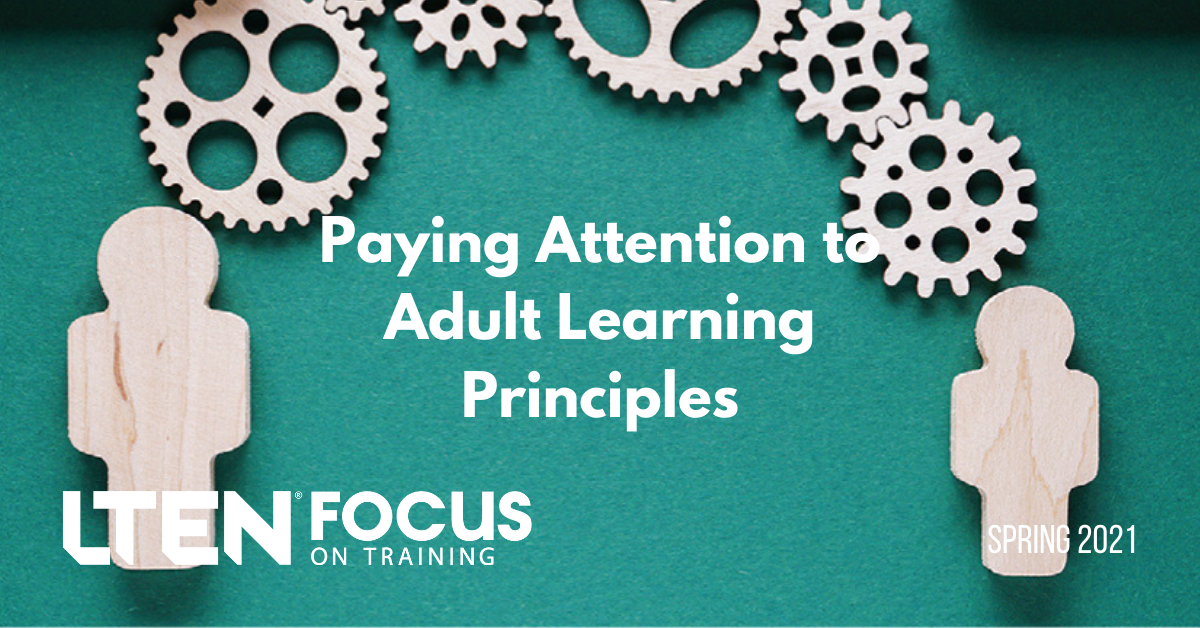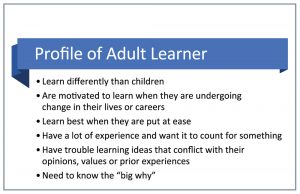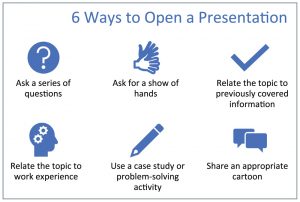
Paying Attention to Adult Learning Principles
Feature Story – By Vivian Bringslimark
 Adults learn differently than children, or so we’ve been told. So why do we treat our learners like children when it comes to mandatory training?
Adults learn differently than children, or so we’ve been told. So why do we treat our learners like children when it comes to mandatory training?
Many trainers start out as subject matter experts and eventually move into a full-time trainer role, and as a result have not had formal training in instructional design. Most have even less exposure to adult learning principles. So, they revert to what they are familiar with.
Awkwardly, this is often a mimic of the high school classroom or a “talking head” webinar. The modern learner is also today’s adult learner.
What are Adult Learning Principles?
Unfortunately, there is no standard list to refer to. An Internet search will yield dozens of opinions or paraphrased summaries of adult learning theories. However, there are a few widely recognized experts, such as Carl Rogers, Robert Gagne (and his Nine Learning Conditions) and Malcom Knowles.
In his seminal 1984 book, The Adult Learner: A Neglected Species, Knowles introduced his readers to six fundamental principles regarding adult learners:
- The learner’s self-concept is self-directed.
- The role of learners’ experiences is rich.
- Their readiness to learn is when it becomes important to them.
- Orientation to learning is problem-centered or life-centered.
- Adult learners need to know the “big why” before beginning to learn it.
- Their motivation is intrinsically derived.
The role of the trainer is no longer the sage on the stage; it’s morphed into a guide on the side and has become a facilitator of learning honoring adult learning needs. It’s less about the trainer’s need to deliver every slide of content and more about the adult learner’s need to engage, change behavior and be able to apply back on the job in the moment of need. This does change the locus of control for the delivery and the design of the learning event.
Learning Participation
The design is now from the learner’s point of view. But what’s interesting to note is that the more trainer-driven the course is, the less participation is required from the learner. When the learner is invited to participate more, the trainer does less talking. The learners acquire knowledge and skills through activities that they experience through the facilitator’s guidance. The facilitator now focuses on helping the learners meet their needs and interests.
Let’s begin with redesigning lectures, for example. While lecture has its merits, today’s adult learners need engaging content that is timely, relevant and meaningful. Yet, most training agendas are full of nice-to-know content buried in with the need-to-know. Whether by directive or the need to “tell them everything because this is the only time I get to train them” mindset, lecture only meets the trainer’s need, not the learners’ needs.
Moving to Effective Lecturettes
Rather than trying to pull off a fully immersive session, trainers can include techniques that “liven up” the delivery of a lecture. This requires the ability to:
- Follow a well-organized design plan.
- Capture and hold learners’ attention.
- Use relevant examples and deviations if possible.
- Show authentic enthusiasm.
- Involve the audience both directly and indirectly.
- Respond to questions with patience and respect.
Great presentations are like great movies. They open with an attention-seeking scene, have drama and conflict in the middle so you stick around long enough to see the hero survive, and then they close on a memorable note.
Using the movie analogy, a trainer-turned-facilitator can open the session with something more than a bio or the course agenda. They can use a thought-provoking quote, or a quick anecdotal incident related to the learning event. Keeping the interest alive, the facilitator can then draw the connection of the content to the audience and address the “what’s in it for me” question on everyone’s mind.
While we don’t need to add to anyone’s stress load, overcoming conflict makes for great storytelling. Case studies, major corrective actions investigations, deviations and audit observations make it more like real life. Use of visuals — especially diagrams — is visually appealing to learners and keeps them engaged.
Thoroughness in the preparation reflects care and thoughtfulness. Learners appreciate the personal desire to deliver a livelier lecture. Therefore, the concept of a lecturette: 5- or 10-minute blocks of time to chunk up complex topics. Interspersing a five-minute lecture segment with an activity — such as small break-out groups or a group whiteboard — gives learners the opportunity to engage with new or more complex content in smaller doses.
Learning Transfer for Real-Time Application
Moving to a more learner-centered approach shifts the focus of the design from “deliver these course objectives” to facilitate learning transfer for behavior change and application, which is the end goal for most training events. The new program design includes opportunities for group participation, utilization of adult learners’ experiences and real-life problem-solving.
Learners are prompted to openly discuss issues and problems within a “learning lab” environment. Trainers become empathic listeners as they create a climate of trust and safety. They become facilitators. Of course, this shift also requires that site leadership and local management not only support the facilitated learning lab concept, but follow through on issues and concerns that surface.
It is through these active exchanges and facilitated dialogue with other learners that thoughtful analysis and interpretation can become the focus of the instruction. The result is that learners take full responsibility for decisions, actions and consequences. They become more accountable for participating, and required training events become less boring.
Vivian Bringslimark is president and owner of HPIS Consulting. Email Vivian at
vbringslimark@hpisconsulting.com.










